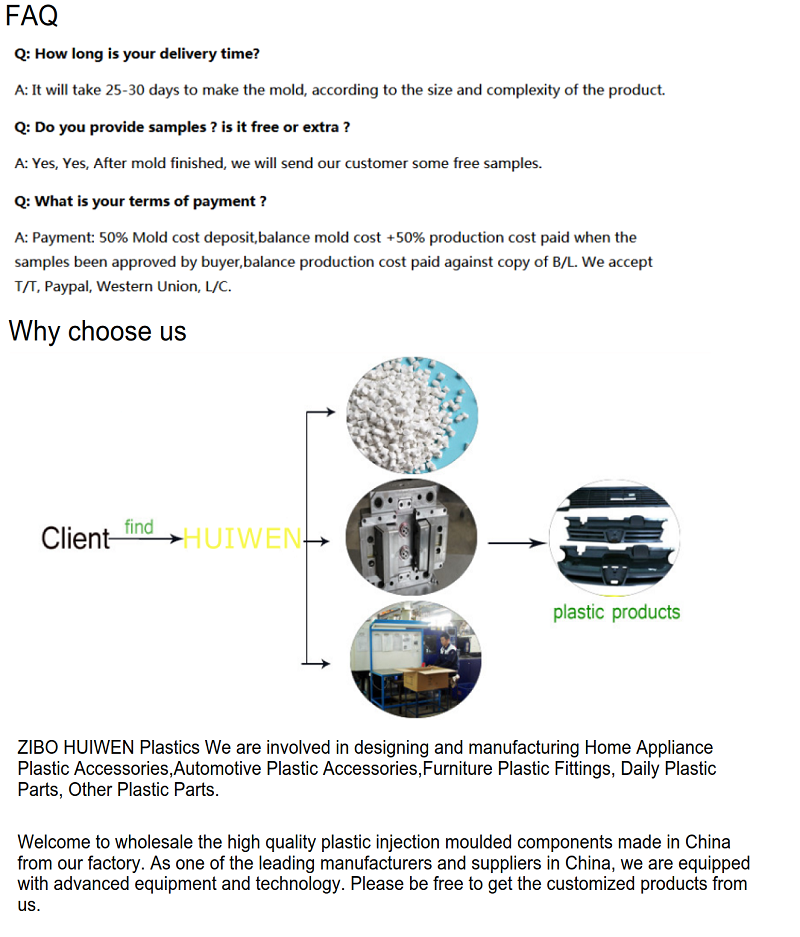Industrial Plastic Injection Molding Parts are a critical element in the manufacturing of high-performance products across numerous industries, particularly in the electronics and construction industries. These precision-engineered plastic parts are manufactured based on rigorous specifications of strength, functionality, and reliability. Whether used in electrical enclosures, control panels, or structural components, these injection molded parts provide a cost-effective and efficient solution to meet today's engineering requirements.
The most significant characteristics of Industrial Plastic injection molding parts are excellent dimensional stability, environmental stress and impact resistance, and mass production with consistent quality. They are produced by high-level molding processes that provide precision and reproducibility. Thermoplastics such as PP (polypropylene), PC (polycarbonate), PE (polyethylene), ABS (acrylonitrile butadiene styrene), PVC (polyvinyl chloride), PS (polystyrene), and nylon are commonly utilized, each of which possesses some unique properties that render them suitable for use in some specific applications.
Plastic Moulding Parts for Electronic Industry are widely utilized in the production of devices and systems that require mechanical strength and electrical insulation simultaneously. They are utilized in circuit board assembly, housing units, and connectors, among other such critical components. The materials' versatility allows manufacturers to tailor their properties according to the particular requirements of different environments, including temperature extremes, chemical exposure, and mechanical stress.
Construction Industry Injection Parts play a vital role in building automation and infrastructure development. Construction Industry Injection Parts, from switchgear enclosures to sensor housings, are what provide the safety, efficiency, and longevity of equipment in the construction field. Light in weight but high in strength, they are ideally suited for use in buildings where every effort is being made to minimize weight without compromising on performance.
From a manufacturing standpoint, plastic injection molding ensures that each part is made with high accuracy and minimal waste. It allows for the creation of complex shapes and fine details that would not be feasible through other means of fabrication. The ability to incorporate color, texture, and surface finishes within the mold process value-adds the end product both functionally and aesthetically.
For businesses in need of reliable suppliers of industrial plastic injection molding parts, it is essential to deal with producers that have expertise in material selection, tooling design, and production optimization. Thorough understanding of the application requirements, as well as adherence to international quality standards, ensures the supplied parts are as anticipated or even improved.
Those in the electronics and construction industries are likely to appreciate the long-term functionality of these injection molded parts. That they are wear and tear resistant and low in maintenance is an added advantage, as this reduces operational costs in the long term. Furthermore, the customization room provided makes it simple to integrate these parts into systems already in place or devise new and innovative applications.
One of the best advantages of Plastic Moulding Parts for Electronic Industry is that they help contribute to trends of miniaturization. As electronic devices become smaller and more sophisticated, the demand for smaller yet durable components only grows. These injection molded parts enable engineers to create and produce devices that are not only smaller but also more efficient and reliable.
In the construction industry, the use of Injection Parts for Construction Industry has led to improved system function and energy efficiency. By replacing metal components with their plastic equivalents that have a lighter weight, builders and engineers are able to reduce structural weight, which means a reduction in material and transport costs. The shift also assists in meeting sustainability goals by reducing the carbon footprint of construction operations.
Lead time, production capacity, and technical support are among the factors to be taken into account in selecting potential suppliers. A good producer would have the ability to provide samples, conduct testing, and provide counsel on material and part design. This interaction guarantees that the product will meet all necessary specifications and operate at its best in the target environment.
Many users have expressed satisfaction with the performance of Industrial Plastic Injection Molding Parts, citing their durability, consistency, and ease of integration into existing systems. Customer reviews highlight the importance of working with experienced manufacturers who understand the unique requirements of the construction and electronics sectors.
Common questions for Plastic Injection Parts for Construction Electronic Industry are usually on the compatibility of the materials, the surface finish, and if they are heat-resistant. Recyclability of the components and if there are environmentally friendly components available are also among queries from certain users. These questions must be answered to build trust as well as to confirm that the parts chosen fulfill technical as well as environmental requirements.
Overall, Industrial Plastic Injection Molding Parts are a valuable investment for companies that operate in the construction and electronic sectors. Their combination of performance, cost-effectiveness, and adaptability has rendered them an outstanding choice for a wide range of applications. From their use in the production of electronic devices to the manufacturing of construction materials, they continue to be a key component of the evolution of modern engineering.










